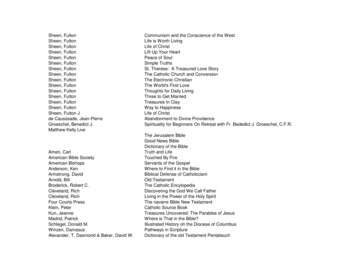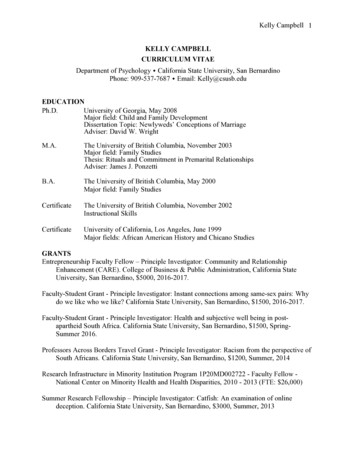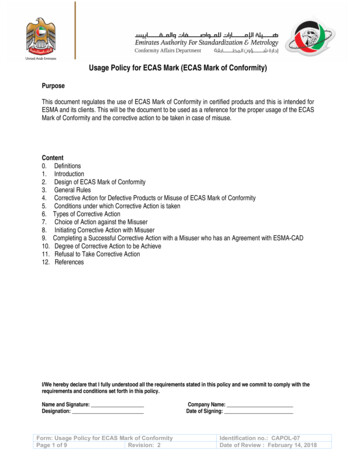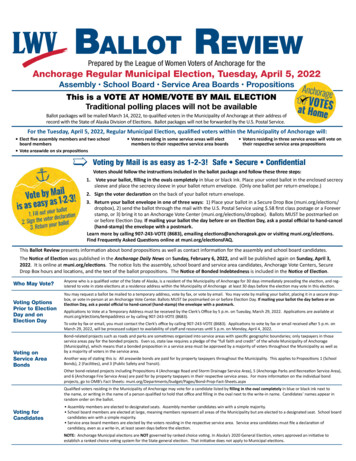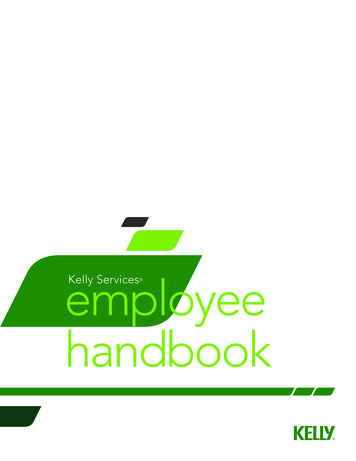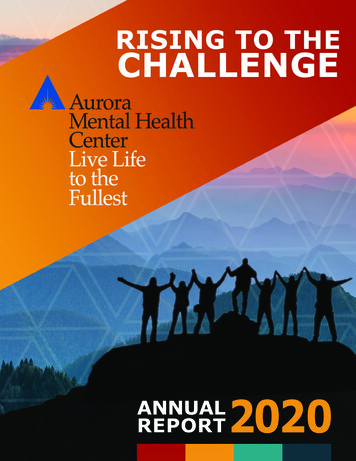
Transcription
Thank you for taking time to read our 2020 Annual Report for thefiscal year July 1, 2019 - June 30, 2020. We compile this reportevery year as a statement of good faith to the Aurora community.You entrust us to provide responsive care to people who live here—our neighbors—and we are pleased to share how we fulfill thoseresponsibilities.KELLY PHILLIPS-HENRYPsyD, MBA/CEOPHOTOCOMINGThe cover of last year’s annual report showcased our five values asan organization. We’ve embraced one of those values, “Rising to theChallenge,” as our theme this year. We hope you will appreciate ourexplanations of this commitment. They include:Responding to the COVID-19 pandemic that has influenced everyaspect of our work and the services we provide for our community.Thanks to our dedicated staff, supportive partners and courageousclients, we never stopped providing care for those in distress andseeking help.Employing new ways to deliver care effectively while ensuring thesafety and health of clients and staff.MARK STEPHENSONBoard PresidentBeing there alongside our neighbors in demonstrations andgatherings, seated at leadership meeting tables, and present in theprivacy of individual therapy sessions as our community seeks toremedy and heal from systemic racism and police violence.Helping our immigrant neighbors secure the resources to help themthrive as full participants in our community.Re-envisioning our work with school-age kids to enhance bothlearning and healing in versatile environments.Riding along with Aurora police to respond with treatmentintervention and care as an alternative to jail when disturbances wereprompted by mental health crises.Receiving designation as a Certified Community Behavioral HealthClinic (CCBHC) and being awarded a significant grant by the federalSubstance Abuse and Mental Health Administration (SAMHSA) as anational model of excellence in behavioral health.Demonstrating fiscal responsibility by maintaining services for clientsand employment for staff while developing new sources of revenue.We invite you to read further in this report for specific details on theseand other ways we’ve risen to the challenges of this past year. Morethan ever, we understand that the pains and griefs that our neighborsbear—too often in isolation—can be eased and healed when we cometogether with compassion and caring.Thank you for joining with us,Your neighbors, Kelly & Mark
Aurora Mental Health Center19,169BY THE NUMBERSFinancialsREVENUEInsurance/client billingOther contracts and donationsState, City, & CountyCLIENTSSERVED 34,155,314 12,808,428 6,029,851 52,993,59364.5%24.2%11.4% 37,164,026 2,435,736 12,195,543 51,795,30571.8%4.7%23.5%EXPENSESSalaries and benefitsOccupancy costsOperating and client costsUnaudited financial %8,804 1,001,812Asian3141.7%5,235 653,2492,81515.7%83,948 8,762,418710.4%2,039 253,6779,46052.7%8404.7%Black/African AmericanWhite/CaucasianMulti-Racial248,649 30,900,05823,682 2,987,209Declined1,1766.5%22,277 2,980,589Not Collected3,03916.9%15,875 1,765,286% ROVIDED%American Indian/Alaska NativeNative Hawaiian/Pacific Islander31.2%CLIENTSMexicanMulti-Hispanic EthnicityCLIENTS2,05711.5%46,136 6,438,128460.3%1,911 230,4921190.7%2,556 358,626Other Hispanic1,7839.9%30,741 4,130,042Not Hispanic9,47952.8%DeclinedNot Collected283,736 32,683,3278224.6%16,428 1,978,2913,65920.4%29,001 3,485,392Telehealth and COVIDWhile it has been a trying and difficult time since March with theworsening of the COVID19 pandemic, AuMHC is pleased to report thesuccess of our rapid shift to telehealth. Since that time we have provided28,128 telehealth services, in comparison to 11 total in the months priorto March.Our transition to telehealth is a testament to the resilience andcommitment of our staff in providing compassionate care to the diversecommunity we serve. The safety of our staff and clients has been atthe forefront of our decision-making process, as we followed state andfederal guidelines, and will continue to do so over the coming months.
Aurora Mental HealthRECEIVES 4MILLION GRANTfrom the SubstanceAbuse and Mental HealthAdministrationSCHOOL BASEDSERVICESWhile the pandemic upended schools and in-personlearning for students, our School Based servicesteam quickly pivoted to provide care virtually. Asschools began reopening this fall, our team hasbeen transitioning back to a hybrid model to meetthe needs of all students, regardless of the school’sdecision to head back into the classroom or continuewith remote learning.Our staff has shown incredible resiliency in meetingthe unique needs of schools and individual clients.They have set flexible hours and become adeptat many virtual therapeutic techniques. Whilethe pandemic created new barriers to accessingtreatment, our team has shown creativity andcompassion in helping clients get the care they need.CONNECTAURORAAurora Mental Health Center is proud of the manyways in which we touch the entire community. We areliving in an unprecedented time, causing many peopleto be without insurance. Now, more than ever, AuroraMental Health Center’s Connect Aurora programstands ready to provide free assistance to communitymembers enrolling with Connect for Health ColoradoMarketplace Insurance, Medicaid and the Child HealthPlan Plus (CHP ).This past year, ConnectAurora assisted 1,760 localhouseholds and enrolled 2,540 people in healthinsurance. In addition to enrollment assistance,ConnectAurora provides instruction in healthinsurance literacy, referrals forMedicare and other assistanceprograms, and assists communitymembers with appeals and othernavigation of the healthinsurance landscape, while alsoconnecting them to behavioralhealth services through AuroraMental Health Center.Aurora Mental Health Center is one of only twoColorado agencies recently awarded a prestigious 4million grant from the Substance Abuse and MentalHealth Administration (SAMHSA). The grant will allowAuMHC to become a designated Certified CommunityBehavioral Health Clinic (CCBHC).CCBHC is a national model of excellence in behavioralhealth, providing community access to services –focusing on person-centered, recovery-oriented carefor people who have serious mental illness or substanceuse disorders. This grant, which runs through April2022, will allow Aurora Mental Health to further developand implement best practices and elevate the standardof care across all areas of operation.CCBHCs provide person- and family-centered,integrated services. The CCBHC Expansion grantprogram must provide community access to services– including 24/7 crisis intervention services forpeople who have serious mental illness (SMI) orSubstance Use Disorder (SUD), including opioid usedisorders; for children and adolescents with seriousemotional disturbance (SED); and for people whohave co-occurring mental and substance disorders(COD). SAMHSA expects that this program willprovide comprehensive, 24/7 access to communitybased mental and SUD services; treatment of COD;and physical health care in a single location.“Community-based hubs for behavioral healthcare are critical to both an individual’s and acommunity’s quality of life, and the currentpandemic has significantly increased the needfor these types of comprehensive services,” saidDr. Kelly Phillips-Henry, CEO for Aurora MentalHealth Center. “As we continue to meet theneeds of people with mental and substance usedisorders, this grant will allow us to improveaccess to care, enhance our services withinvestments in technology, training, data-drivenperformance monitoring and create an overallimproved client experience.”
Aurora Mental Health CenterPARTNERING WITH AURORA POLICEIN CRISIS RESPONSEIndividuals in mental health crises can be easily overwhelmed by law enforcement responses. That’s why weare proud to be part of the Crisis Response Team (CRT), a collaborative effort between Aurora Mental HealthCenter and the Aurora Police Department. Our mission is to provide trauma-informed, compassionate careto individuals experiencing a mental health crisis. Our crisis clinicians and case managers act as a liaisonbetween front-line police work and the community. The officers on the team are Crisis Intervention Teamtrained through Aurora Mental Health Center and are skilled in effectively dealing with situations involving aperson experiencing a mental health crisis.SERVICES eenagenciesGOALS OF THE CRT Prevent the unnecessary incarceration and/orhospitalization of mentally ill individuals. Provide care in the least restrictive environmentthrough a coordinated and comprehensive systemwide approach. Prevent the duplication of mental health services. Expedite the return of patrol units to patrolactivitiesHelping individualsin crisis navigatethe behavioralhealth systemThis year, the Crisis Response Team answered1,907 calls for service in the Aurora community– an average of more than five per day. In everysituation, the subject received treatment in placewithout use of force, and many agreed to engage infollow-up treatment or were admitted to our Walkin Crisis Center for further care. We are proud ofthe partnership we have formed with public safetyproviders and look forward to continuing our supportin the community.MENTAL HEALTH FIRST AID---PROVIDES TOOLSTO THE COMMUNITYOur Mental Health First Aid program is part of aninternational network of trainers who empowerindividuals to identify, understand, and respond to thosewho are experiencing a mental, emotional, or substanceabuse crisis. To date, more than 75,000 Coloradoresidents have received the eight-hour training, manyof them teachers, first responders, and healthcareproviders, as well as employers, faith leaders, businesspersons, and people of all walks.The COVID pandemic significantly curtailed our deliveryof the MHFA program this year, though we were able toconduct six trainings and certify 148 community memberswith this potentially life-saving experience.
SUBSTANCE RECOVERYAND DETOX SERVICESPoised to Expand andProvide Greater Servicesto the CommunityWe are facing a national crisis and the need forSubstance Use Disorder (SUD) services is huge. ACDC study finds thatexcessive alcohol use isresponsible for more than255 deathseach day in the U.S.,or over 93,000DEATHS PER YEARrecent Centers for Disease Control and Prevention(CDC) study finds that excessive alcohol use isresponsible for more than 255 deaths each dayin the U.S., or over 93,000 deaths per year. Anddespite a 30-year decline in drug overdose deathssince 1990 in the U.S., the pandemic may haveushered in even greater spikes.With the recent purchase of the East Metro Detox& Recovery Services building located at 1290 S.Potomac St., and the ever-increasing demand forSUD services, AuMHC is poised to significantlyexpand services and generate a significant increaseThere’s expected to be a continuing rise inin clients. The plan is for this 50,384 sq. ft.substance abuse throughout the pandemic,property to serve as a hub for all 24/7 servicesand increased rates of addiction afterward, dueand access. Once that is all up and running,to the stress of isolation, boredom, decreasedthe size of the building could potentially lead toaccess to recovery resources and unemployment.residential SUD treatment, in line with MedicaidNPR reported that “new data from around thefunding that goes into effect January 2021, andU.S. confirms that drug overdoses are spikingadditional hospital step-down beds. A team isduring the coronavirus pandemic, rising bycurrently working on a business plan for area, androughly 18 percent.”details will be shared as they develop.
AURORA YOUTHOPTIONSProvides Mentorshipand Life LongConnectionsSuccess can be measured in manyways. For our Aurora Youth Options(AYO) program, it is about livestouched through the work of staffand volunteers.We are honored to share the storyof volunteer mentor Cybele Antonowand her mentee Katelyn Todd. Whenthe two met, Katelyn was 15. Yearslater, they are still friends, and Toddis attending college and pursuing adouble major.Antonow was one of the firstadults in Todd’s life who listenedprofoundly and tried to understandwhere she was coming from,even though her experiencewas different. Over the years,the two talked and shared,while Antonow provided positivementorship, helping with goalsetting, relationships, school, selfconfidence, and coping with stress.For Antonow, the relationship with Todd has been mutually satisfyingand uplifting, giving each the space to explore who they were in newways and growing due to the interactive dynamic.AYO works with Aurora middle and high-school-aged youth andtheir families, helping young people gain life skills and confidencefor personal success and happiness. Our AYO staff is committedto providing services to youth and families from mentoring tohomework, along with many other opportunities, while shifting to avirtual space.MEETING PEOPLEwhere they are throughhomeless servicesOur Homeless Services, Pathways to Home,has risen to the occasion, taking on thepandemic’s challenges to help those in need.We have partnered with Aurora Warms theNight and the Salvation Army, providingmobile drop-in services, allowing us to dostreet outreach along the Colfax Corridor. Weprovide food and hygiene kits, masks, andhand sanitizer, along with information andeducation about COVID19.Additionally, we have provided mobile phones, giving people the means to stay connected to case managersand speak to therapists for ongoing and long-term help and mental health needs. With the increase in peoplewho have never faced homeless before, our efforts are crucial during this trying time. We are thankful to ourstaff and partners, who have made our continuing work possible.
EXECUTIVE TEAMCHIEF EXECUTIVE OFFICER Kelly Phillips-HenryCHIEF EXPERIENCE OFFICER Lori BanksCHIEF FINANCIAL OFFICER Loretta Buckman,effective 12/1/2020CHIEF MEDICAL OFFICER Anne Garrett-MillsCHIEF FINANCIAL OFFICER Deanna GravesCHIEF CLINICAL OFFICER Mara KalinINTERIM CHIEF INFORMATION OFFICER Doug ReynoldsCHIEF STRATEGY AND OPERATIONS OFFICER Kathie SnellCHIEF CORPORATE INTEGRITY OFFICER Victoria RodgersVP CLINICAL OPERATIONS Kirsten AndersonVP HUMAN RESOURCES Colleen CullenEXECUTIVE DIRECTOR Harry Budisidharta, Asian PacificDevelopment CenterEXECUTIVE DIRECTOR Antonio Olmos, Aurora Research InstituteEXECUTIVE ASSISTANT & BOARD LIAISON Beth DazeyBOARD OF roraPRESIDENT Mark StephensonVICE PRESIDENT Lynn DonaldsonTREASURER Tom AshburnSECRETARY Nancy JacksonBrian BagwellDan BeyerTammy BerberickMarsha BerzinsLinda DavisonGigi de GalaTim HuffmanParitosh Kaul, MDClaudine McDonaldSteve NederveldDavid PattersonCathy Wildman@AuroraMentalHealth@Aurora MentalHealth CenterLook forour messages.@Aurora MentalHealth Center
Your neighbors, Kelly & Mark Thank you for taking time to read our 2020 Annual Report for the fiscal year July 1, 2019 - June 30, 2020. We compile this report every year as a statement of good faith to the Aurora community. You entrust us to provide responsive care to people who live here—
